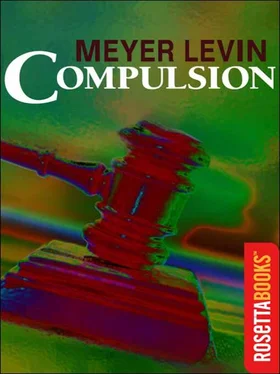“I see.” Padua picked up the glasses from the table and handed them to Judd. “Are these yours?”
Judd felt them against his hand, with that sense of natural contact given by a familiar possession. He put them on. “Well,” he said, “I would say they were mine, if I weren’t sure that mine are at home right now.” He laughed shortly. “That is, unless someone swiped them, though I can’t imagine why.”
If it went that far he could suggest a whole flood of possibilities. He might have left his glasses at the university, or anywhere; the murderer could have picked them up. He was certainly safe if he played it right, because with this bit of evidence alone – and it was clear it was all they had – they wouldn’t dare go to court. Not against a son of Judah Steiner!
“You say your glasses are at home?”
“Why, yes. As I haven’t worn them for months.” He turned to McNamara, who was sitting by the door. “If you’d have mentioned it at my house, I’d have produced them for you.”
“Well” – Padua smiled – “it won’t take long to pick them up.”
McNamara arose from the chair.
Judd placed the glasses on the desk. “I believe mine are a very common prescription,” he said, and then checked himself. Could it be possible that they had called in everyone in town with glasses of that prescription? No, that would have meant thousands. There must have been some other factor leading to him. What could it be?
He smiled at his questioner, and made an abortive gesture to shake hands on leaving. But Padua didn’t stand up, didn’t reach out his hand. As he left with McNamara, Judd felt that he had not exactly won the first round.
He thought over the interview. It was a little disturbing that his antagonist had been so brief. Why hadn’t they asked for his alibi? Or perhaps that was on the good side. As for the glasses, perhaps Almer Coe had recognized them in some way as their product.
Would Artie still be in the house? Perhaps he had fled. Artie could run up to Charlevoix, take his boat, and hide out on one of those little islands, as he had so often dreamed of doing. Perhaps they should both have beat it up there, and they would be living there together now, hermits bound together for the rest of their lives.
Max had just come home; he was dressing to take his fiancée to the theatre. Judd explained curtly, annoyed with Max for being there, “These men are from the state’s attorney’s office. It seems the glasses found in the Kessler case are similar to mine. They’ve been checking all the people who have similar glasses.”
Max blinked once or twice, as though uncertain whether to take an insulted attitude toward the authorities or make a gag of it. “I’m just going to get my glasses and show them,” Judd said. “They’re in my room.”
But McNamara and Peterson followed him upstairs. On entering the room, the detective was startled. “What’s this, a museum?”
Judd explained that he was an ornithologist. But he felt instantly that the room had made a point against him. He was now someone queer. Trying to recover, he made an effort to impress the detective, telling him this was the most complete collection in the Midwest, and that he had a special permit to shoot specimens, even in the city parks. The man’s dumb-animal stare altered. A glint of respect had come into it.
Meanwhile Judd made a show of looking among his papers, on his desk. Then he opened a few drawers. “I haven’t used them for such a long time-” At the second drawer he said, “Oh, here!” He picked up the spectacle case, then held it in his hand with a puzzled look.
McNamara took the empty case from him.
“I can’t imagine-” Judd frowned. “They must be around here somewhere.” He poked aside a pile of books.
The maid had come to the door. “Have you seen my glasses anywhere?” he asked. “I haven’t used them for some time.”
“Why, no,” she said. “Did you look downstairs in the library?”
He never read in the library. The last one who read there had been his mother; not a book had been added since. Frowning, Judd started downstairs, to make a show of it. “There was a mob in here yesterday; we had an engagement party,” he remarked. “A lot of our friends got tight and turned the house upside down.”
McNamara nodded but did not at once follow him to the stairs. It swept through Judd’s mind that they would search his room. In that moment he tried to visualize everything that was in his desk, every scrap of paper. The ransom letter had been typed on stationery bought outside. The envelope was not from his stock, either. And yet he felt uneasy. If they started to search, should he demand a warrant? Or would that be bad, arousing suspicion? But McNamara turned away from the desk and came downstairs. The other one, Peterson, still stood there.
Judd made a big show of searching the library, the living room, irked as they followed him from room to room. Peterson had come down, finally; he remained aloof, but McNamara seemed to want to be helpful, picking up a magazine here and there as if expecting to find the glasses underneath. Or was he a cagey brute, using this means to rub it in? Judd said, “Well, I really can’t explain it. I must have lost them somewhere without realizing it.”
Max, all dressed up, ready to leave, appeared in the hallway. “Look, kid, what’s this all about?”
“Can’t you see!” Judd snapped. “I’m looking for my glasses.”
“Well, so you lost your glasses, so what?” And to the detectives Max said, “This is ridiculous.” But he checked himself. “Of course, I realize you have to go through with it and make a thorough checkup. But-”
“I’ll have to go downtown with them again,” Judd said, “and explain.”
“Say-” Max half laughed at the idea of even having to make such a statement, but he told the detectives, “anyone you want to vouch for the kid here – why, Judge Wagner is a friend of my father’s. I understand, I’ve read in the papers, the Judge has been very helpful to the Kessler family. Now, Judge Wagner’s known Judd since he was a kid. Why don’t you give him a ring?”
“Well, that would depend on them downtown,” McNamara said.
“Do you want me to come along, Judd?” Max offered.
“Why, no! What for?” Judd was smiling again, but his hostility to his brother was rising in him, stronger than ever.
“Well, give Judge Wagner a buzz if there’s any complication,” Max repeated.
Now on the drive downtown the silence was ominous. Whatever he thought of saying might be interpreted the wrong way. Judd remarked only that he hoped his carelessness wasn’t going to keep them working very late. It was all right, they said; they were used to it.
McNamara asked about the birds, and Judd started to talk enthusiastically. “A kind of hobby?” the policeman inquired.
“Well, it’s more than that.” And he gave them examples of puzzling things about migration and mating. Perhaps all this would show them he was unworried.
The hotel room looked messier. The men had had sandwiches and coffee sent up; plates and cups were scattered on desks and chairs. McNamara handed the empty spectacles case to Padua. “He couldn’t find the glasses,” he said.
Padua picked up the horn-rimmed spectacles from his desk, slipped them into the case. He made nothing special of the little action, but, gesturing with the same hand, introduced Judd to an older man.
“This is Mr. Horn, the State’s Attorney,” Padua said.
On first sight, Horn had a way of confusing people. He was not so much ugly as odd-looking; his face was exactly half-moon in shape, with a tiny, almost caved-in nose. His torso was bulky, his legs were very short, his movement was abrupt. And his voice had a shrill, rather feminine pitch.
Читать дальше












